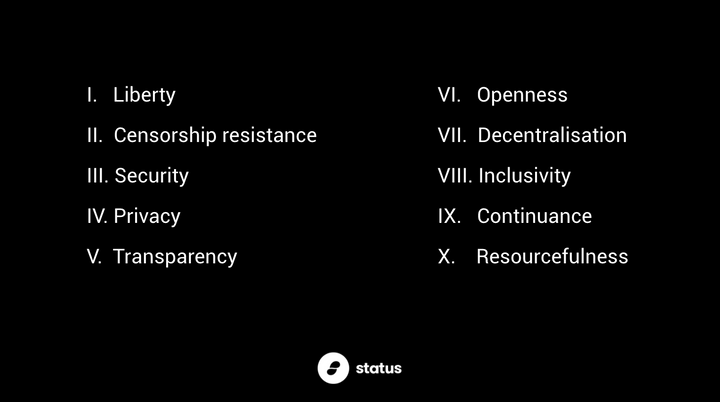Status provides a list of principles that drive us, found here. Our principles motivate our design decisions, which features make it into Status, and what infrastructure we use (or build). Here's how they help you.
Liberty
Status believes in freedom, and in maximizing the individual freedom of our users.
Crypto and Web3 are avenues to a more free society. Self-sovereignty is a pillar of the philosophical underpinnings of crypto, motivating people to build better tools to bring about this more free society. The influence of traditional finance and big tech has invaded our habits and homes, and there it has festered. The interactions you have with friends and family have moved to the internet, or cellular networks, where they are under the constant scrutiny of these new invisible overlords.
Crypto maximizes liberty by allowing us to engage with commerce and finance without the approval or oversight of banks, hedge funds, etc. Web3 allows us to engage with social network and in communication without the approval or oversight of big tech. Status allows you to communicate socially and financially (and with stickers) without fear of surveillance—from us, from oppressive governments, or from anyone else.
Censorship Resistance
Censorship is a pervasive issue among web2 social media and communication platforms (e.g. two that we’ve written about: Reddit and Twitter). Companies care about limiting your speech, because they’ve made it their business. They care about restricting the ideologies they dislike, and reinforcing ideas they find “safe” or marketable (or profitable). And they have to bow to external demands for censorship, because they suffer from the same weaknesses as all centralized organizations.
We call ourselves an “agnostic platform for information.” This means that we don’t care (nor do we even know) who/what/when/where/why you are communicating about. When you send a message on Status, no one at Status can read your message. No one at Status can inspect its contents, and decide whether or not they are politically correct, or match with our corporate-approved ideology—which doesn’t exist. Status supports free speech, and does so with infrastructure that prevents us, or anyone else, from censoring you.
Security
Status is one of the most secure private messengers in the world. Status uses the Waku protocol—an evolution of the whisper protocol, which is used by Signal. Waku is supported by a decentralized network of peers that routes messages. Broadcast messages are encrypted, and can only be opened by the intended recipient. Because Waku has no centralized bottlenecks, your message contents and metadata remain your own, and nobody can spy on your data. The Status messenger is the most secure p2p chat in the world.
Status is also one of the most secure wallets—safe from attack, whether you are sending, storing, or receiving cryptocurrency. Your private keys are in your hands, and are never exposed. Transactions are only ever processed when initiated and confirmed by the owner of the keys.
We also protect your data while using our Web3 browser. Your data and browsing information are not provided to any third parties without your consent. The browser implements the same security standards as the Status wallet, so your Web3 activity is secure.
Status aims to be a truly decentralized communication and commerce tool. We are constantly working to remove third parties and minimize attack vectors. For more details on our security, see here.
Privacy
Status exists in part due to a dissatisfaction and mistrust of centralized, and often unencrypted communication platforms—e.g., 93% of Americans believe it is important to control who has information about them. SMS texting, for example, offers privacy in that most people most of the time are not going to read your messages—but this privacy is an illusion. Your neighbor may not know what you’re texting your friends/family/lovers about, but your mobile company will, as will your government, if they ask.
Status prevents anyone from reading your messages (besides you and the recipient, of course), and enables pseudo-anonymous interaction with Web3, DeFi, and society in general. Of course, you can be as anonymous as you like: Status supports linking with ENS names, and nothing is stopping you from sharing your chat key.
At Status, we strongly believe that the convenience of letting a messenger application use your phone number to automatically build your social network is not worth the risk of privacy invasion from entities that have both the motive and resources to do so. This is especially true when people do not trust legal processes to be fair and so rely fundamentally on technology to protect their privacy and perhaps even their lives. For such people, code is law. [Privacy vs Convenience]
For more information, check out Crypto as a Public Good: Privacy.
Transparency
We strive for complete openness and symmetry of information within the organization, and have no border between our core contributors and our community. We are frank about our shortcomings, especially when making short-term tradeoffs in service of our long-term goals.
Status is concerned with making public goods. We consider a decentralized private messenger a public good, and thus it's only right for the public to have transparency in our work. Status, like many other projects in the Status Network, is open source. Trust code over companies, as they (or we?) say.
Our development processes are accessible and transparent, and we have several guides and tutorials for community contributors.
We also release Status on F-Droid, and if you want to be sure of your Status binary you can build it yourself (instructions here).









